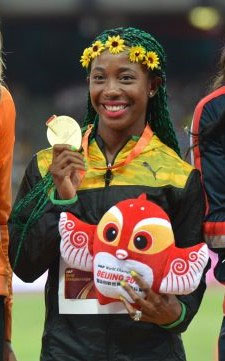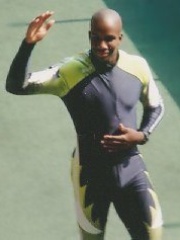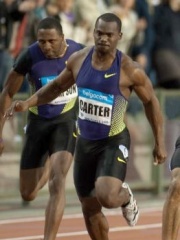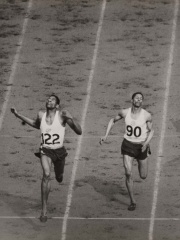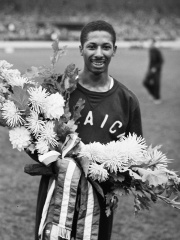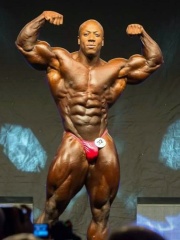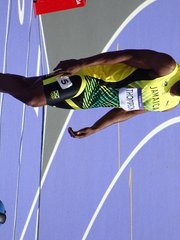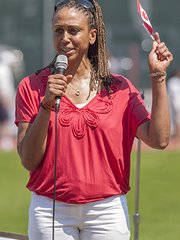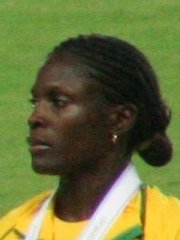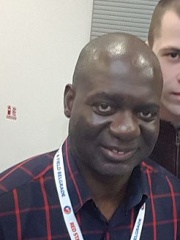
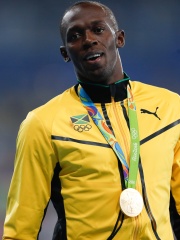

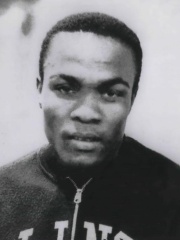
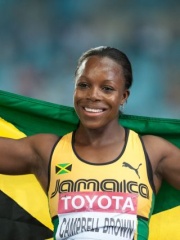

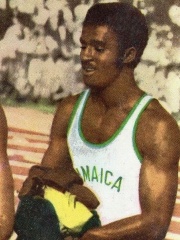

The Most Famous
ATHLETES from Jamaica
This page contains a list of the greatest Jamaican Athletes. The pantheon dataset contains 6,025 Athletes, 142 of which were born in Jamaica. This makes Jamaica the birth place of the 26th most number of Athletes behind Norway, and Switzerland.
Top 10
The following people are considered by Pantheon to be the top 10 most legendary Jamaican Athletes of all time. This list of famous Jamaican Athletes is sorted by HPI (Historical Popularity Index), a metric that aggregates information on a biography's online popularity. Visit the rankings page to view the entire list of Jamaican Athletes.

1. Ben Johnson (b. 1961)
With an HPI of 67.98, Ben Johnson is the most famous Jamaican Athlete. His biography has been translated into 40 different languages on wikipedia.
Benjamin Sinclair Johnson, (born December 30, 1961) is a Canadian former sprinter. During the 1987–88 season he held the title of the world's fastest man, breaking both the 100 m and the 60 m indoor World Records. He won the 100 metres at the 1987 World Championships in Athletics; and at the 1988 Summer Olympics, but was disqualified for doping and stripped of the gold medals. He was the first to beat the 9.9 and 9.8 seconds barrier. He won two bronze medals at the 1984 Summer Olympics, as well as gold medals at the 1985 World Indoor Championships, 1986 Goodwill Games and 1986 Commonwealth Games. He was trained by Charlie Francis.

2. Usain Bolt (b. 1986)
With an HPI of 67.72, Usain Bolt is the 2nd most famous Jamaican Athlete. His biography has been translated into 119 different languages.
Usain St. Leo Bolt ( YOO-sayn; born 21 August 1986) is a Jamaican retired sprinter who is widely regarded as the greatest sprinter of all time. He is an eight-time Olympic gold medalist and the world record holder in the 100 metres, 200 metres, and 4 × 100 metres relay. Bolt is the only sprinter to win Olympic 100 m and 200 m titles at three consecutive Olympics (2008, 2012, and 2016). He also won two 4 × 100 relay gold medals. He gained worldwide fame for his double sprint victory in world record times at the 2008 Beijing Olympics, which made him the first person to hold both records since fully automatic time became mandatory. An eleven-time World Champion, Bolt won consecutive World Championship 100 m, 200 m and 4 × 100 metres relay gold medals from 2009 to 2015, with the exception of a 100 m false start in 2011. He is the most successful male athlete of the World Championships. He is the first athlete to win four World Championship titles in the 200 m and is one of the most successful in the 100 m with three titles, being the first person to run sub-9.7s and sub-9.6s races. Bolt improved upon his second 100 m world record of 9.69 with 9.58 seconds in 2009 – the biggest improvement since the start of electronic timing. He has twice broken the 200 metres world record, setting 19.30 in 2008 and 19.19 in 2009. He has helped Jamaica to three 4 × 100 metres relay world records, with the current record being 36.84 seconds set in 2012. Bolt's most successful event is the 200 m, with three Olympic and four World titles. The 2008 Olympics was his international debut over 100 m; he had earlier won numerous 200 m medals (including 2007 World Championship silver) and held the world under-20 and world under-18 records for the event until being surpassed by Erriyon Knighton in 2021. His achievements as a sprinter have earned him the media nickname "Lightning Bolt", and his awards include the IAAF World Athlete of the Year, Track & Field Athlete of the Year, BBC Overseas Sports Personality of the Year (three times), and Laureus World Sportsman of the Year (four times). Bolt was included in Time magazine's 100 Most Influential People of 2016. Bolt retired after the 2017 World Championships, when he finished third in his last solo 100 m race, opted out of the 200 m, and pulled up injured in the 4 × 100 m relay final.

3. George Rhoden (1926 - 2024)
With an HPI of 60.70, George Rhoden is the 3rd most famous Jamaican Athlete. His biography has been translated into 27 different languages.
George Vincent Rhoden (13 December 1926 – 24 August 2024) was a Jamaican athlete, winner of two Olympic gold medals in 1952. Rhoden was born in Kingston on 13 December 1926. He later moved to San Francisco, California, and was one of the successful long sprinters from Jamaica in the late 1940s and early 1950s, along with Arthur Wint and Herb McKenley. He competed in the 1948 Summer Olympics, but did not win a medal, being eliminated in the heats of the 100 m and the semi-final of the 400 m. He was also a member of the heavily favoured Jamaican 4 × 400 m relay team, but when Wint pulled a muscle in the final, their chances at a medal were gone. On 22 August 1950 at Eskilstuna, Sweden, Rhoden set a new world record in 400 m of 45.8 s. He also won the AAU championships in 400 m from 1949 to 1951 and as a Morgan State University student, won the NCAA championships in 220 yd (200 m) in 1951 and in 440 yd (400 m) from 1950 to 1952. He was a member of Alpha Phi Alpha fraternity. At the 1952 Summer Olympics in Helsinki, Rhoden was more successful. As a world record holder he was one of the pre-race favourites in the 400 m which he won in a close battle with his compatriot McKenley, who had also been second in the 1948 Olympic 400 m. As the anchor runner of the Jamaican relay team, Rhoden added a second Olympic gold, edging the United States where he lived by a tenth of a second, and setting a new world record (3:03.9). He died on 24 August 2024, at the age of 97.

4. George Kerr (1937 - 2012)
With an HPI of 59.81, George Kerr is the 4th most famous Jamaican Athlete. His biography has been translated into 17 different languages.
George Ezekiel Kerr (16 October 1937 – 15 June 2012) was a Jamaican athlete who competed in the 400 and 800 metres. He competed for the British West Indies at the 1960 Summer Olympics, where he won the bronze medal in the 800 metres. He then teamed up with Keith Gardner, Malcolm Spence and James Wedderburn to win the bronze medal in the 4×400 metres relay. In 1962, he became the first Jamaican athlete to have the national flag flown in recognition of winning a gold when he won double gold in the 400 m and 800 m at the Central American and Caribbean Games held at Kingston's National Stadium. At the 1964 Olympics, representing Jamaica, he finished fourth both in the 800 m and the 4 × 400 m relay. He broke the Olympic record for the 800 m in the semi-finals but lost the bronze by less than one-tenth of a second with 1:45.9, his fastest ever time. Kerr won five medals at three Commonwealth Games. In 1958 he won a bronze in the 4 × 440 yards relay. He won gold medals in the 440 yards and in the 4 × 440 yards relay and silver in the 880 yards in 1962. His final medal, a bronze for the 880 yards, came in 1966 in Kingston, Jamaica. Kerr won the British AAA Championships title in the 880 yards event at the 1961 AAA Championships. On 4 June 2012, Kerr had a heart attack and underwent heart surgery at the University Hospital of the West Indies. He remained in the intensive care unit until he succumbed to complications. He had a wife, Fay Kerr, five children, Karyn, Margaret, Roger, Candice and William and seven grandchildren.
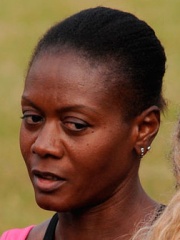
5. Merlene Ottey (b. 1960)
With an HPI of 59.54, Merlene Ottey is the 5th most famous Jamaican Athlete. Her biography has been translated into 34 different languages.
Merlene Joyce Ottey (born 10 May 1960) is a Jamaican-Slovenian former track and field sprinter. She began her career representing Jamaica in 1978 and continued to do so for 24 years before representing Slovenia from 2002 to 2012. She is ranked sixth on the all-time list over 60 metres (indoor), eleventh on the all-time list over 100 metres and seventh on the all-time list over 200 metres. She is the current world indoor record holder for 200 metres with 21.87 seconds, set in 1993. She was named Jamaican Sportswoman of the Year 13 times between 1979 and 1995. Ottey had the longest career as a top-level international sprinter appearing at the 1979 Pan American Games as a 19-year-old fresh from U-20 and Junior competitions, and concluding her career at age 52 when she anchored the Slovene 4 × 100 m relay team at the 2012 European Championships. A nine-time Olympic medalist, she holds the record for the most Olympic appearances (seven) of any track and field athlete. Although gold medal success at the Olympics eluded Ottey, she was able to bring home three silvers and six bronze medals. She won 14 World Championship medals, and still holds the record (as of 2017) for most medals in individual events with 10. Her career achievements and longevity led to her being called the "Queen of the Track". Her proclivity for earning bronze medals in major championships earned her the title of "Bronze Queen" in track circles. Ottey was formerly married to the American high jumper and 400 m hurdler Nat Page and was known as Merlene Ottey-Page during the mid-1980s.

6. Veronica Campbell-Brown (b. 1982)
With an HPI of 56.86, Veronica Campbell-Brown is the 6th most famous Jamaican Athlete. Her biography has been translated into 40 different languages.
Veronica Campbell Brown (née Campbell; born15 May 1982) is a Jamaican retired track and field sprinter, who specialized in the 100 and 200 meters. An eight-time Olympic medalist, she is the second of three women in history to win two consecutive Olympic 200 m gold medals, after Bärbel Wöckel of Germany and compatriot Elaine Thompson-Herah. Campbell-Brown is one of only eleven athletes to win World Championship titles at the youth, junior, and senior levels of an athletic event. She holds personal bests of 10.76 seconds for the 100 m and 21.74 seconds for the 200 m. She was the 100 m gold medallist at the 2007 World Championships in Athletics and the 200 m gold medallist at the 2011 World Championships in Athletics. She has also won seven silver medals and one bronze medal in her career at the World Championships in Athletics. Over 60 metres, she is a two-time champion at the IAAF World Indoor Championships.

7. Lennox Miller (1946 - 2004)
With an HPI of 55.96, Lennox Miller is the 7th most famous Jamaican Athlete. His biography has been translated into 21 different languages.
Lennox Valencia Miller (8 October 1946 in Kingston, Jamaica – 8 November 2004 in Pasadena, California) was a champion runner and father of Inger Miller. Representing Jamaica, Miller won the silver medal in the 100 meters in the 1968 Summer Olympics and the bronze in the 1972 Summer Olympics, also in the 100. He and Inger are the first father-daughter to win Olympic track and field medals. He was her coach prior to her winning gold in the 1996 Summer Olympics. Both ran for the University of Southern California, where Miller earned a degree in psychology and graduated from the dental school. He had been a dentist in Pasadena for 30 years. While at USC, Miller anchored the still standing World Record 4x110 yard relay at the NCAA Men's Outdoor Track and Field Championships, held at Brigham Young University in Provo, Utah. The Imperial distance became defunct as the IAAF now only recognizes metric races (except the one Mile run), so the event is rarely run and not part of elite competition. The record was also complicated because of Miller's Jamaican citizenship, the makeup of the team was not entirely from one country. Miller took the baton from O. J. Simpson. Also on the team was future NFL star Earl McCullouch.

8. Don Quarrie (b. 1951)
With an HPI of 54.54, Don Quarrie is the 8th most famous Jamaican Athlete. His biography has been translated into 26 different languages.
Donald O'Riley Quarrie CD (born 25 February 1951) is a Jamaican former track and field athlete, one of the world's top sprinters during the 1970s. At the 1976 Summer Olympics he was the gold medallist in the Olympic 200 meters and silver medallist in the Olympic 100 meters. In all, he competed in five Olympic Games and won four Olympic medals during his career. He nearly equalled the 200 meters world record in 1971, coming within .03 seconds of the time set by Tommie Smith in 1968. He has a personal best of 19.86 seconds set in Cali, Colombia on 3 August 1971. As of 2024, this remains the track record. He won 100 metres/200 metres sprint doubles at the 1970 Commonwealth Games, 1971 Pan American Games, and 1974 Commonwealth Games. He was the first male to defend either the 100 m or 200 m title at the Commonwealth Games and a 100 m win at the 1978 Commonwealth Games makes him the only person to have won that title three times. He won nine gold medals in the sprints at the Central American and Caribbean Championships in Athletics from 1971 to 1981. He has received recognition both on and off the field. He was a five-time winner at the Jamaican Sportsperson of the Year and a statue of him is positioned at the entrance to Jamaica's National Stadium. There is also a school (Donald Quarrie High School) that bears his name in Eastern Kingston. Reggae artists have paid respect to his achievements with songs including "Tribute to Donald Quarrie", one by Joe Gibbs and The Guerrillas and one by Bongo Herman.

9. Elaine Thompson (b. 1992)
With an HPI of 54.30, Elaine Thompson is the 9th most famous Jamaican Athlete. Her biography has been translated into 46 different languages.
Elaine Sandra-Lee Thompson-Herah, née Thompson, (born 28 June 1992) is a Jamaican sprinter who competes in the 60 metres, 100 metres and 200 metres. Regarded as one of the greatest sprinters of all time, she is a five-time Olympic champion, the fastest woman alive in the 100 m, and the third fastest ever in the 200 m. Thompson-Herah is the first-ever female sprinter, and the second sprinter after Usain Bolt, to win the "sprint double" at consecutive Olympics, capturing 100 m and 200 m gold at the 2016 Rio Olympics, and defending both titles at the 2020 Tokyo Olympics. A six-time Olympic medallist, she rose to prominence at the 2015 World Athletics Championships, winning silver in the 200 m and, at the time, becoming the fifth-fastest woman in history over the distance. The next year at the Rio Olympics, she became the first woman since Florence Griffith Joyner in 1988 to win 100 m and 200 m gold at the Olympics. After the Rio Olympics, Thompson-Herah was plagued by an Achilles tendon injury, which affected her performance at the 2017 World Athletics Championships and the 2019 World Athletics Championships. However, she returned to the top of athletics at the Tokyo Olympics, retaining her 100 m title in a new Olympic record of 10.61 s, and her 200 m title in a new personal best and national record of 21.53 s. After winning a third gold medal in the 4 × 100 m relay, she became the third sprinter after Griffith Joyner and Bolt to complete an Olympic sprinting triple. At the 2021 Prefontaine Classic, Thompson-Herah set another 100 m personal best, Jamaican and Diamond League record of 10.54 s, becoming the first woman to break the 40 km/h barrier, then ran times of 10.64 s and 10.65 s. For her season she was voted Laureus Sportswoman of the Year, and World Athletics World Female Athlete of the Year. One of the most dominant sprinters in the world, she is the 100 m 2019 Pan American Games champion and a three-time Diamond League winner. In 2022, retired American sprinter Michael Johnson called Thompson-Herah and her compatriot Shelly-Ann Fraser-Pryce the two greatest female sprinters of all time.
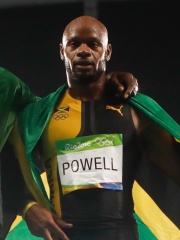
10. Asafa Powell (b. 1982)
With an HPI of 54.14, Asafa Powell is the 10th most famous Jamaican Athlete. His biography has been translated into 52 different languages.
Asafa Powell CD (born 23 November 1982) is a Jamaican retired sprinter who specialised in the 100 metres. He set the 100 metres world record twice, between June 2005 and May 2008 with times of 9.77 and 9.74 seconds. Powell has consistently broken the 10-second barrier in competition, with his personal best of 9.72 s ranking fourth on the all-time list of men's 100-metre athletes. As of 1 September 2016, Powell has broken the 10-second barrier more times than anyone else—97 times. He currently holds the world record for the 100-yard dash with a time of 9.07 s, set on 27 May 2010 in Ostrava, Czech Republic. In 2016, he became Olympic champion in the 4 × 100 metres relay. Powell competed in the 100 m at the 2004, 2008 and 2012 Olympics, finishing fifth in 2004 and 2008 and eighth after injuring his groin during the race in 2012. At the 2007 Osaka World Championships, he achieved a bronze and a silver medal in the 100 m and 4 × 100 m relay respectively, and he was successful at the Commonwealth Games, winning twice plus achieving a silver medal. At the 2009 World Championships, he achieved the 100 m bronze and became champion in the relay. Powell has won five times at the IAAF World Athletics Final and was the former 100 m world record holder in the event. In 2013, Powell tested positive for the stimulant oxilofrine along with teammate Sherone Simpson and voluntarily withdrew from the 2013 World Athletics Championships as a result, though both maintained they did not take any banned supplements knowingly or willfully. On 10 April 2014, they received an 18-month suspension from competing, which was set to expire in December that year. However the Court of Arbitration for Sport (CAS) lifted both athletes' suspensions on 14 July 2014, finding that the positive tests were caused by the presence of oxilofrine, undisclosed by the manufacturer, in a supplement taken by the pair.
People
Pantheon has 142 people classified as Jamaican athletes born between 1920 and 2003. Of these 142, 134 (94.37%) of them are still alive today. The most famous living Jamaican athletes include Ben Johnson, Usain Bolt, and Merlene Ottey. The most famous deceased Jamaican athletes include George Rhoden, George Kerr, and Lennox Miller. As of April 2024, 21 new Jamaican athletes have been added to Pantheon including Devon Morris, Michael McDonald, and Michelle Burgher.
Living Jamaican Athletes
Go to all RankingsBen Johnson
1961 - Present
HPI: 67.98
Usain Bolt
1986 - Present
HPI: 67.72
Merlene Ottey
1960 - Present
HPI: 59.54
Veronica Campbell-Brown
1982 - Present
HPI: 56.86
Don Quarrie
1951 - Present
HPI: 54.54
Elaine Thompson
1992 - Present
HPI: 54.30
Asafa Powell
1982 - Present
HPI: 54.14
Shelly-Ann Fraser-Pryce
1986 - Present
HPI: 52.01
Donovan Bailey
1967 - Present
HPI: 51.05
Yohan Blake
1989 - Present
HPI: 49.56
Ray Stewart
1965 - Present
HPI: 48.23
Nesta Carter
1985 - Present
HPI: 47.59
Deceased Jamaican Athletes
Go to all RankingsGeorge Rhoden
1926 - 2024
HPI: 60.70
George Kerr
1937 - 2012
HPI: 59.81
Lennox Miller
1946 - 2004
HPI: 55.96
Arthur Wint
1920 - 1992
HPI: 52.52
Keith Gardner
1929 - 2012
HPI: 50.88
Herb McKenley
1922 - 2007
HPI: 50.47
Shawn Rhoden
1975 - 2021
HPI: 48.55
Germaine Mason
1983 - 2017
HPI: 41.85
Newly Added Jamaican Athletes (2025)
Go to all RankingsDevon Morris
1961 - Present
HPI: 44.62
Michael McDonald
1975 - Present
HPI: 41.42
Michelle Burgher
1977 - Present
HPI: 40.46
Kishane Thompson
2001 - Present
HPI: 39.44
Nikole Mitchell
1974 - Present
HPI: 38.94
Catherine Scott
1973 - Present
HPI: 38.16
Charmaine Crooks
1962 - Present
HPI: 37.73
Delloreen Ennis-London
1975 - Present
HPI: 37.50
Juliet Campbell
1970 - Present
HPI: 37.49
Rojé Stona
1999 - Present
HPI: 37.30
Jerome Young
1976 - Present
HPI: 36.40
Gillian Russell
1973 - Present
HPI: 34.99
Overlapping Lives
Which Athletes were alive at the same time? This visualization shows the lifespans of the 8 most globally memorable Athletes since 1700.

